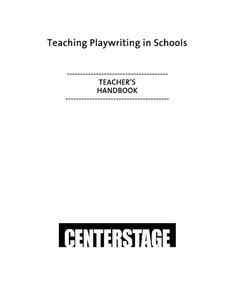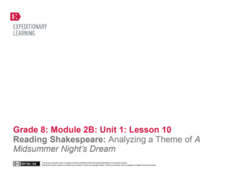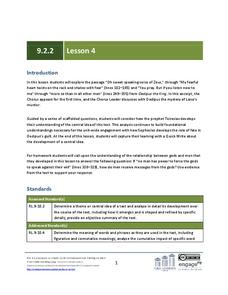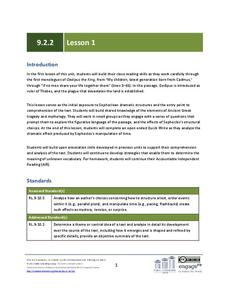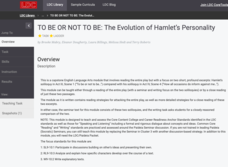Curated OER
Magical Musical Tour: Using Music Lyrics to Teach Literary Elements
While music lyrics are often used to teach literary elements, the richness of this resource comes from the wealth of exercises, activities, and support materials provided in the packet. Although designed for gifted learners, the...
National Endowment for the Humanities
The Glass Menagerie: Key Themes
Using the list of expressionist techniques generated in the first instructional activity, groups analyze how Williams uses these techniques to develop one of the play's themes. The whole class then shares and discusses the examples they...
Learning to Give
Teaching Playwriting in Schools
The world is a stage, and so is your classroom! Hone the skills of the next generation of Tony® award winners with a set of exercises, reference pages, writing prompts, and excerpts from famous plays.
EngageNY
Reading Shakespeare: Analyzing a Theme of A Midsummer Night’s Dream
After finishing Act I, scene 1 from Shakespeare's A Midsummer Night's Dream, class members study the theme of control as it relates to the play and start an Evidence of Control note-catcher worksheet.
EngageNY
Analyzing Character and Theme: Tracking Control in A Midsummer Night’s Dream
Pupils first participate in a drama circle as they continue reading Shakespeare's A Midsummer Night's Dream aloud with classmates. Next, scholars move around and discuss text-dependent questions about the play with a Three Threes in a...
Maryland Department of Education
A Raisin in the Sun and Dreams Deferred
To conclude a study of A Raisin in the Sun and to prepare for a visit to the Lewis Museum, class members analyze Langston Hughes' poem "Harlem." Learners then draw connections to characters in the play and to their own experiences by...
EngageNY
Leaving the Play: All’s Well That Ends Well
How does Shakespeare develop the theme of control in A Midsummer Night's Dream? Using the resource, scholars analyze the theme of parental control in the play and the Greek myth "Pyramus and Thisbe." Next, they talk to partners to...
Penguin Books
A Teacher's Guide to the Signet Classic Edition of William Shakespeare's King Lear
King Lear is a powerful and complex tragedy that looks deeply into political power and family dynamics, loyalty, betrayal, aging, and madness. This teaching guide includes scene-by-scene plot summaries, information about the elements of...
EngageNY
Grade 9 ELA Module 2, Unit 2, Lesson 2
Continue a thoughtful analysis of Sophocles' Oedipus the King by discussing the importance of dialogue within the play's structure. Ninth graders examine how Oedipus speaks about himself to his subjects and Creon before recording their...
Penguin Books
A Teacher's Guide to the Signet Classics Edition of Macbeth by William Shakespeare
Double, double scholars' appreciation of the Scottish Play with a guide that adds a rich brew of pre-reading background information, chapter discussion questions, activities, and writing prompts to provide readers with a "firm and good"...
EngageNY
Grade 9 ELA Module 2, Unit 2, Lesson 10
The slow curse of realization begins to sink in during the tenth lesson in a literary analysis unit on Sophocles' Oedipus the King. Ninth graders carefully read the selected lines for evidence of Oedipus' feelings during a turning point...
Houghton Mifflin Harcourt
Around Town: Neighborhood and Community: Challenge Activities (Theme 3)
Here is a unit consisting of activities designed to challenge your scholars. The extended learning opportunities include planning a celebration, making a presentation to the class, poster making, writing poetry, a problem-solving...
Literacy Design Collaborative
Macbeth: Influence of Supernatural
Something wickedly wonderful this way comes in a instructional activity that focuses on Macbeth. After a close reading of the play, class members craft a literary analysis essay in which they use evidence from the text to show how...
Star Wars in the Classroom
"Shakespeare and Star Wars": Lesson Plan Day 4
Class members have an opportunity to compare how a film and a play handle the same source material by viewing the opening chapters of George Lucas's Star Wars: A New Hope and acts I and II of Ian Doescher's play, William Shakespeare's...
California Education Partners
Glass Menagerie
As a reading comprehension assessment, ninth graders are asked to use evidence drawn from The Glass Menagerie to support an analysis of how Tennessee Williams uses specific lines to develop Amanda's character as well as her relationships...
EngageNY
Grade 9 ELA Module 2, Unit 2, Lesson 14
The devil—and the truth—is in the details. As ninth graders approach the ending of Sophocles' Oedipus the King, they analyze the words of the Messenger and apply these details to the central ideas of fate and prophecy.
Curated OER
Teaching Julius Caesar: A Differentiated Approach
While the themes of Julius Caesar may appeal to most readers, the act of reading the play can be a challenge. A unit plan related to the popular play by Shakespeare provides lesson plans and activities designed for differentiated...
National Endowment for the Humanities
The Glass Menagerie: Impact of Expressionism
Young scholars are challenged to write a realistic analysis of Tennessee Williams' nonrealistic memory play, The Glass Menagerie. Writers use the evidence gathered on their worksheets to craft an effective thesis and concluding statement...
EngageNY
Grade 9 ELA Module 2, Unit 2, Lesson 4
The concept of sight, whether it's a lack of sight or abundant sight of the future, plays a vital role in Sophocle's Oedipus the King. Develop your ninth graders' literary vision with a lesson that connects the prophecy of Teiresias to...
EngageNY
Grade 9 ELA Module 2, Unit 2, Lesson 8
Prophecy and blindness often go hand in hand, as in Sophocles' Oedipus the King. Explore Oedipus' thoughts about prophecy, fate, and responsibility with an activity focused on the discussion between Creon and Oedipus regarding the murder...
EngageNY
Grade 9 ELA Module 2, Unit 2, Lesson 3
The manipulation of time is one of the most essential elements in Sophocles' Oedipus the King. As your language arts class participates in a jigsaw discussion activity, they work together to analyze the play's plot structure and...
EngageNY
Grade 9 ELA Module 2, Unit 2, Lesson 1
Delve into the heart of dramatic dialogue with a unit focused on Oedipus the King by Sophocles. Having completed an online exploration about ancient Greece beforehand, ninth graders read the play's opening lines and analyze how...
EngageNY
Grade 9 ELA Module 1: Unit 3, Lesson 18
Why is Romeo and Juliet considered a tragedy? Class members conclude their reading of the play, focusing on the final lines of Act 5, scene 3. They also consider how Shakespeare structures the text, orders events, and manipulates time to...
Literacy Design Collaborative
To Be or Not to Be: The Evolution of Hamlet’s Personality
How does Hamlet's state of mind change over the course of Shakespeare's most famous revenge tragedy? After a close reading of Hamlet's soliloquies in Act III, scene 1 and Act IV, scene iv, class members engage in a Paideia/Socratic...




